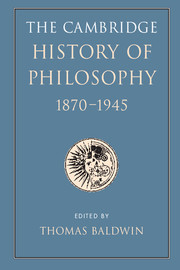Book contents
- Frontmatter
- Contents
- List of contributors
- Introduction
- I 1870–1914
- II 1914–1945
- 8 Logic and philosophy: the analytic programme
- 9 The diversity of philosophy
- 32 The continuing idealist tradition
- 33 Transformations in speculative philosophy
- 34 Realism, naturalism, and pragmatism
- 35 French Catholic philosophy
- 36 Spanish philosophy
- 37 The phenomenological movement
- 38 Heidegger
- 39 Latin american philosophy
- 40 Japanese philosophy
- 10 Knowledge, language, and the end of metaphysics
- 11 Philosophy and the exact sciences
- 12 Mind and its place in nature
- 13 Philosophy and social science
- 14 Ethics, religion, and the arts
- 15 Law and politics
- Biobibliographical appendix
- Bibliography
- INDEX
- References
37 - The phenomenological movement
from 9 - The diversity of philosophy
Published online by Cambridge University Press: 28 March 2008
- Frontmatter
- Contents
- List of contributors
- Introduction
- I 1870–1914
- II 1914–1945
- 8 Logic and philosophy: the analytic programme
- 9 The diversity of philosophy
- 32 The continuing idealist tradition
- 33 Transformations in speculative philosophy
- 34 Realism, naturalism, and pragmatism
- 35 French Catholic philosophy
- 36 Spanish philosophy
- 37 The phenomenological movement
- 38 Heidegger
- 39 Latin american philosophy
- 40 Japanese philosophy
- 10 Knowledge, language, and the end of metaphysics
- 11 Philosophy and the exact sciences
- 12 Mind and its place in nature
- 13 Philosophy and social science
- 14 Ethics, religion, and the arts
- 15 Law and politics
- Biobibliographical appendix
- Bibliography
- INDEX
- References
Summary
The Phenomenological Movement was one of the dominant philosophical fashions on the continent of Europe from the early 1920s until the late 1970s. Hundreds of philosophy professors in Europe, Japan, and in the United States conceived of themselves as phenomenologists in at least some stage of their careers, and countless articles and books have been published under the phenomenological flag. Among the many causes that explain the popularity of phenomenology, three may be mentioned. First, whereas the scientific revolutions of the beginning of the twentieth century threatened the traditional position of philosophy as a separate and foundational discipline, seminal phenomenologists such as Husserl and Heidegger, at least in his early works, reasserted the foundational role of philosophy, claiming that they had discovered a philosophical method distinct from the methods of empirical science. Second, this method seemed to enable phenomenologists to widen the scope of philosophical research in unprecedented ways, thereby attracting those who felt suffocated by philosophy as a limited academic discipline. Finally, phenomenology allowed philosophers to discuss problems of life which became pressing during and after the world wars, in particular because of the way in which Heidegger had integrated the existential philosophy of Kierkegaard and the philosophy of life of Wilhelm Dilthey into his phenomenological masterpiece Sein und Zeit (Being and Time, 1927). The popularity of phenomenology cannot be understood without taking such cultural factors into account.
- Type
- Chapter
- Information
- The Cambridge History of Philosophy 1870–1945 , pp. 477 - 496Publisher: Cambridge University PressPrint publication year: 2003



